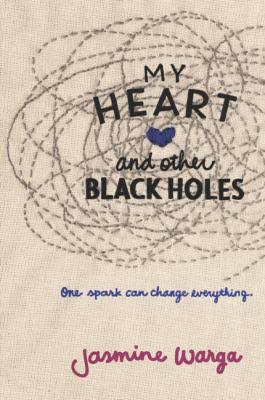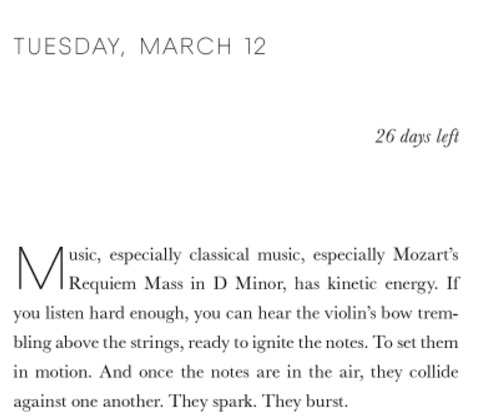
Jasmine Warga’s My Heart and Other Black Holes and Narrative Efficiency
Aysel is sad and socially isolated because she feels her father’s shocking crime makes her a pariah. Her mother, step-father and step-sister love her dearly, but Aysel is simply depressed and needs help. Instead of speaking with a mental health professional, Aysel finds Smooth Passages, a web site where suicidal folks can support each other to complete the act. Aysel meets Roman, a young man who happens to live in a nearby town. The two young people set a date when they will commit self-slaughter.
Of course, the story doesn’t end there. Aysel and Roman build a friendship in the weeks before their departure date and open up to each other in ways they haven’t done with their families, friends and other loved ones. Jasmine Warga tells a beautiful and true story about the unhealthy ways in which we can deal with our pain and glorifies the safest road to happiness: feeling a connection with the rest of humanity.
My Heart and Other Black Holes begins in a manner that is guaranteed to intrigue and immerses the reader in the narrative:
See what Ms. Warga did? She began the novel with a countdown. The reader may know nothing else about the book, but he or she is immediately aware that SOMETHING BIG IS GOING TO HAPPEN in 26 days. Want to know what that big thing is? You have to keep reading. (John Green employed a similar technique in Looking for Alaska…read for further detail.)
Another reason that countdowns are so effective is that they contextualize the ending of the story in the context of the protagonist’s life. In the case of My Heart and Other Black Holes, we learn that these are ostensibly the last 26 days of Aysel’s life. Ms. Warga makes it clear very quickly that Aysel is young and is physically healthy; the countdown forces the reader to consider a number of questions:
- Why does Aysel want to die?
- What is her family like?
- What’s the big source of shame she’s holding back?
- How long has she felt this way?
- What was her early childhood like?
Isn’t it amazing? All Ms. Warga did was type “26 days left” and the reader wants to know more and is devoting great thought to the young woman whose journey we will witness.
Beyond the countdown, Ms. Warga does a lot of great work releasing the exposition in the first few chapters. It’s a bit of a whirlwind, actually, but the author keeps it under control.
“26 days left” takes place at Aysel’s awful call center job. Ms. Warga establishes that:
- Aysel spends “a lot of time wondering what dying feels like.” We know she’s suicidal.
- Aysel frequently visits Smooth Passages, her “favorite website of the moment” and one dedicated to “people who want to die.”
- Aysel believes there’s nothing that can “fix her,” to lift her melancholy.
- Brian Jackson is an Olympic-bound athlete and the pride of his hometown, but is a replacement for Timothy Jackson, his brother. And everyone in town thinks of the older Jackson when they see Aysel because his death is her fault somehow through her father.
- Aysel is looking for a suicide partner to run away from her “black hole of a future” and this FrozenRobot chap is a good candidate…and he’s only fifteen minutes away.
- Aysel and FrozenRobot “have a date: April 7.”
That’s a lot of stuff, isn’t it? And it all comes in the first twelve pages. The next chapter (the first “25 days left”) is equally economical. We see Aysel during a day at school and are told that her father is the reason Timothy Jackson is dead. Once all of the exposition is out of the way, the author is allowed to zoom ahead with the plot. Sure, Ms. Warga has a lot more to explain and part of the joy of this book is unraveling the mysteries that rule Aysel’s and Roman’s lives, but the author shrewdly opens up the book to compensate for a protagonist whose mind is so closed. Unfortunately, Aysel simply can’t deviate too much from her intense depression early in the book. If she did, she might not come across as relentlessly suicidal. While Aysel still languishes in her sadness, the reader doesn’t get bored because she’s driving to the next town, meeting new people, meeting Roman’s mother, spending time wondering about Roman’s own sad mystery, getting ready for the Spring Carnival…phew! There’s a lot of change going on in the narrative, which keeps the book interesting because the protagonist’s mindset can’t change, at least not immediately.
This book is also great because it doesn’t waver in its commitment to its subject matter. This novel is about two young people who make a pact to commit suicide together. It must, by definition, be hardcore. Ms. Warga “keeps it real” by painting Aysel’s thoughts in a realistic manner. Look at some of the things the young woman says in the narration:
- “I can’t exactly tell Mr. Scott that I won’t be able to attend that summer program because I won’t be alive.”
- “I used to feel so devastated thinking about the length of days, about how time seems to stretch on forever, unforgiving and unchanging. And like John Berryman said, so boring. I wonder if this is how marathon runners feel once they reach the last mile; they know they can make it through the final stretch, so there’s no use in getting fatigued at this point.”
- “I stare at Mrs. Franklin, her smiling, eager-to-please face, and know that Roman and I are about to break her heart.”
- “But that would require me to talk in class, which would violate one of my personal rules. I don’t participate. Why? Because I’m fucking sad.”
Is it pleasant to think about a young man or woman (or a person of any age) making their quietus? Of course not. It’s blunt subject matter and Ms. Warga deals with it in a blunt fashion. If you’re dealing with an unpleasant subject-and dramatic tension often relies upon such-then you must deal with that subject in an honest fashion. Aysel is so depressed that she wants to die. The story is told from her first person perspective, so we need constant reminders of her welcomed mortality.
Ms. Warga’s book is a good example of the kind of Young Adult literature that has seized so much of my attention since a lot of “literary” work has left me so cold. While Ms. Warga offers some beautiful sentences, she also offers an inexorable plot. The book has a message (a very important one), but that message is never privileged over the need to tell the reader what is happening to Aysel and why.
As if you needed any more motivation to read the book (or to make YA a larger part of your reading diet), look at this fan-made trailer for the book. Sometimes I wish As could be more like YAs because the latter group expresses so much love for what they read.
Note: Ms. Warga includes some resources for those who may be experiencing suicidal ideation. In that spirit, I remind you that the National Suicide Prevention Hotline is available at 1-800-273-TALK.

